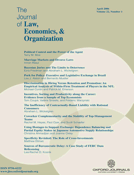-
Views
-
Cite
Cite
Tom Coupé, Valérie Smeets, Frédéric Warzynski, Incentives, Sorting and Productivity along the Career: Evidence from a Sample of Top Economists, The Journal of Law, Economics, and Organization, Volume 22, Issue 1, April 2006, Pages 137–167, https://doi.org/10.1093/jleo/ewj010
Close - Share Icon Share
Abstract
In this paper we study empirically the labor market of economists. We look at the mobility and promotion patterns of a sample of 1,000 top economists over thirty years and link it to their productivity and other personal characteristics. We find that the probability of promotion and of upward mobility is positively related to past production. However, the sensitivity of promotion and mobility to production diminishes with experience, indicating the presence of a learning process. We also find evidence that economists respond to incentives. They tend to exert more effort at the beginning of their career when dynamic incentives are important. This finding is robust to the introduction of tenure, which has an additional negative ex post impact on production. Our results indicate therefore that both promotions and tenure have an effect on the provision of incentives. Finally, we detect evidence of a sorting process, as the more productive individuals are allocated to the higher ranked universities.



